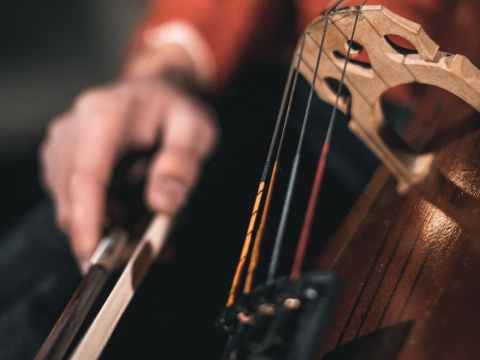PAUL O’DOWD
Bees are on the decline globally due to an assortment of human impacts. This is likely to cause a botanical and agricultural catastrophe in the near future if we can’t reverse the trend. Bee hives can be made to order and provide bees with important protected hive habitat to assist them in remaining in our landscapes. Some blokes in Mossman have taken it upon themselves to use their combined making skills to produce native stingless bee hive boxes in the hope that interested people will buy them and thus support both the bee population, and the great efforts of the Men’s Shed generally.
+ Bees are the primary pollinators for a vast range of the plants we rely on for our survival + Bees are killed by the insecticides used in gardens and farms and this, along with other human impact factors, is leading to their rapid decline
+ We can help bees by planting bee-friendly flowering plants, finding alternatives to insecticides, and setting up native stingless bee hive boxes to give them a safe place to raise their young
+ The Men’s Shed in Mossman is making high quality native stingless bee hive boxes which will support both the bee population and provide a modest source of funds to help support their own very worthy mission
There is a slow motion catastrophe unfolding right under our noses.
It will cause some of the hardest times to come. Perhaps the hardest times in human history.
It’s not the latest infection that’s going around. It’s not even the economic depression that our reaction to it has caused. In fact, these issues pale in comparison to the real catastrophe.
The real defining catastrophe of the days just on our horizon, has barely even registered on most people’s radar.
It relates to the imminent collapse of modern plant-based agriculture and the collapse of many, if not most flowering plant life on this planet.
Plants are losing their primary means of reproduction globally. Bees are disappearing from landscapes all over the world, and with them, their crucial service as the primary pollinators for a large percentage of the Earth’s botanical diversity.
Bees are diverse. There are many species, with an incredible range of habits and habitats. Most are solitary, like bumblebees. Others are hive-building, community-minded creatures, who operate in vast numbers of coordinated workers to oversee the distribution of plant genes across huge swathes of land.
They are all succumbing to the sweeping changes that have come in the wake of our own species’ rise.
One of the biggest threats to bee populations is the chemical and genetic technology that our modern agricultural systems now rely upon.
Insecticides kill insects. Bees are insects. Therefore insecticides kill bees.
But who could possibly have predicted that, right?
Plants engineered for “pest resistance” express chemicals that either kill insects or prevent their reproduction.
On top of that, with only a couple of commercial bee species being made artificially dominant across managed landscapes, native bee populations are being driven out of entire areas, leading to a reduction in the diversity of pollinators available to do the job.
With chemically-stressed, weakened commercial beehives becoming vulnerable to disease and parasitism, these diseased hives become vectors for problems that go on to affect wild populations. Other chemical and genetic adjustments to agricultural landscapes, along with the intensive monoculturalisation of the commercial bees themselves, are inflicting more complicated and collateral injury upon our busy pollinators.
It’s a real ‘can of worms’ when you get into the details, so, suffice to say, we are really doing a deadly number on the animals that make the plants we depend upon, viable.
Soon, they will be largely gone and then, shortly thereafter, so will we.
One group of men in Mossman are taking a proactive stance in addressing this problem.
The Men’s Shed, at the Mossman Community Centre, have a track record of building and restoring items to meet various needs. In fact they built my brother a fantastic “snake hospital” some years back.
One important tactic in the global effort to save the bees, is to help maintain the natural diversity of native bee species in our landscapes. Apart from avoiding the use of bee killing chemicals and planting a wide range of natural bee feeding flowers wherever you can grow them, a very powerful tool in the bee guardian’s kit, is the artificial hive box.
These hive boxes are made commercially, as well as by backyard enthusiasts. Their design specifications vary by bee type, and can be found online quite easily. They need to be well-built with appropriate materials though, and nicely made hive boxes are not cheap on the market.
Native honey bees have a few important advantages over European honey bees. They are much smaller insects, so their hives are only a fraction of the size of a commercial hive. For various interesting reasons, they are not as prone to the disease issues that afflict commercial bees.
The best thing about them for the budding bee keeper though, is that they are completely stingless!
Typical purchasers of native stingless bee hives include small orchard farmers, gardeners, schools and anyone hoping to promote pollinators on their flowering landscapes and to help solve a serious problem.
When the blokes at the Men’s Shed were approached about the idea of making some boxes, their reaction was one of immediate enthusiasm.

More than that though, they pointed out that in their own workspace, in a restoration job they had just taken on, there were two complete wild native stingless bee hives, inconveniently jammed into the spaces between the panelling, and at that point they did not know what to do about them.
They could not easily dismantle the item, but spraying the bees would result in a couple of kilograms of dead bee meat forever trapped in the item’s walls. It was a pickle.
The bee box idea presented a possible solution.
By placing a perfect hive habitat against each entrance hole on the restoration piece, the native bees would hopefully realise the availability of this new real estate and move their operations out of the narrow cavity they were in, and relocate to the new, empty mansion next door.
In fact, while a demonstration hive box sat on the counter, they saw numerous curious bees investigating it within five minutes of opening up the Shed.
This led to the realisation that, not only could they make the boxes, but they could actually begin populating them with the descendants of the first two relocated hives. This would put them in the position of being able to provide live functioning native stingless beehives, ready to pollinate fruit trees and gardens and make honey for its lucky new owner.
From being an awkward and potentially very smelly problem, their inconveniently placed wild hives became a windfall.
The Men’s Shed are now on the build. They are turning out quality finished units to sell to the public. If you want a new hive box to populate with your own bees, contact us for more information.
If you buy a beehive from the Shed, you will not only be helping our precious bees but you will also be helping the Mossman Men’s Shed to raise a few dollars for their important original mission of providing a safe and friendly place for men to meet and work together on interesting projects. The basic boxes without an active hive are available now. You will need to find a wild hive and park the box next to it for a while. There are good resources online to learn what to do and how to care for your hive.
If you would like a live hive, ready to go, then watch this space. The lads are working on the relocation of their wild bees and when they have the first two occupied hive boxes, they will grow and divide them to produce more.






